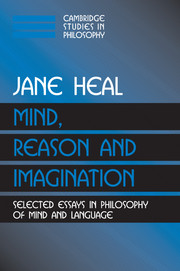Book contents
- Frontmatter
- Contents
- Preface
- Sources
- Mind, Reason and Imagination
- 1 Introduction
- PART I MIND, THEORY AND IMAGINATION
- PART II THOUGHT AND REASON
- 6 Co-Cognition and Off-Line Simulation: Two Ways of Understanding the Simulation Approach
- 7 Semantic Holism: Still a Good Buy
- 8 Other Minds, Rationality and Analogy
- PART III INDEXICAL PREDICATES AND THEIR APPLICATIONS
- PART IV THINKING OF MINDS AND INTERACTING WITH PERSONS
- References
- Index
7 - Semantic Holism: Still a Good Buy
Published online by Cambridge University Press: 18 December 2009
- Frontmatter
- Contents
- Preface
- Sources
- Mind, Reason and Imagination
- 1 Introduction
- PART I MIND, THEORY AND IMAGINATION
- PART II THOUGHT AND REASON
- 6 Co-Cognition and Off-Line Simulation: Two Ways of Understanding the Simulation Approach
- 7 Semantic Holism: Still a Good Buy
- 8 Other Minds, Rationality and Analogy
- PART III INDEXICAL PREDICATES AND THEIR APPLICATIONS
- PART IV THINKING OF MINDS AND INTERACTING WITH PERSONS
- References
- Index
Summary
INTRODUCTION
Holism is an alluring and heady notion. Many claims that this or that notion is ‘holistic’ have been made, and in particular the idea that semantic notions such as meaning or content are ‘holistic’ has seemed plausible to a good number of philosophers. It is not obvious, however, that they have all meant the same thing, and Fodor and Lepore, in Holism: A Shopper's Guide, have performed a useful service (Fodor and Lepore 1992). They offer an account of what holism is, together with an outline attack on it and an attempt to undermine the major arguments for it. There is, however, further clarification to undertake since, despite their best efforts, the exact content of the thesis remains in doubt. This is in part because Fodor and Lepore (sometimes with and sometimes without argument) proceed as if certain distinct positions are in fact equivalent. The upshot of this is that plausible versions of semantic holism are run together with implausible versions, and the innocent are made to suffer with the guilty.
The structure of the rest of this essay is as follows. The next section aims to disentangle various ways in which ‘semantic holism’ may be understood and to explain how some of them seem to get run together by Fodor and Lepore. Section 3 is primarily ad hominem.
- Type
- Chapter
- Information
- Mind, Reason and ImaginationSelected Essays in Philosophy of Mind and Language, pp. 115 - 130Publisher: Cambridge University PressPrint publication year: 2003
- 1
- Cited by



